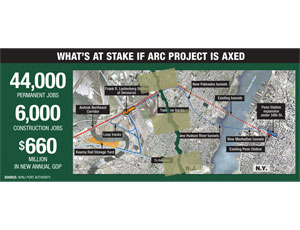The tenuous fate of an estimated $8.7-billion trans-Hudson River rail tunnel exemplifies a dilemma faced by the American transportation industry as a whole: how to fund crucial megaprojects at a time when raising fuel taxes is political suicide and passing a multiyear transportation bill remains a pipe dream.
New Jersey Gov. Christopher Christie (R) announced on Oct. 7 that he was killing the project, called Access to the Region’s Core (ARC) and in development for almost 20 years. But after a quickly arranged meeting with U.S. Transportation Secretary Ray LaHood and Federal Transit Administrator Peter Rogoff the next day in Trenton, Christie agreed to a two-week study of unspecified project “options.”
LaHood convened “a small working group” of U.S. Dept. of Transportation and New Jersey Transit (NJT) officials to review project options for Christie by Oct. 22. So far, information about the negotiations is top secret: an NJT spokesman declined to reveal the number and identities of group members.
Supporters of ARC—which includes a 5,200-ft-long Palisades tunnel, a 5,300-ft-long Manhattan tunnel, a 7,400-ft pair of tunnels under the river, and a controversial new terminus under 34th Street in midtown Manhattan—envisioned it as a crucial new link between the Garden State and New York City that would create 6,000 direct construction jobs.
Despite project commitments of $3 billion each from the Federal Transit Administration and the Port Authority of New York and New Jersey, Christie said he feared cost overruns could cost New Jersey between $2 billion and $5 billion. “The fact that the ARC project is not financially viable and is expected to dramatically exceed its current budget remains unchanged,” he said. But Christie noted LaHood “presented several options to potentially salvage a trans-Hudson tunnel project.” Officials would not confirm published reports that options may include private investors or ways to shrink the scope of the project.
“It’s looking dire,” says Brian Deery, senior director at the Associated General Contractors of America. “They’re looking at other options, but I can’t imagine how many are out there. The [government] won’t put in its share if the state won’t.”
One ARC official says cost projections of up to $14 billion would happen “only if everything goes to hell.” He says the project’s likely final cost would exceed the current figure even though construction bids favor owners in the current competitive marketplace. The official adds that, among other things, officials are looking at an approach with more phases that would enable “minimum operating service” by the current 2018 completion date. He notes the potential savings if Amtrak decides to fund and manage a new Hackensack River bridge. That project, estimated at $775 million, would replace a 100-year-old span that carries Amtrak and regional transit trains. The official says reviewers may link ARC’s Manhattan terminus with a possible Amtrak high-speed-rail station that would be separate from Penn Station.
While observers call Christie “prudent” for wanting to scrutinize the project, they worry about the message sent if it is killed. “Termination of ARC raises the specter of a larger shift in public support for major infrastructure investments,” says Richard Anderson, president of the New York Building Congress.
As state and local governments continue to face budget shortfalls, more long-term projects may be reconsidered. Tom Warne, former chief of the Utah Dept. of Transportation and now a Salt Lake City consultant, says, “The tunnel is needed, no question. But can they provide it in a form that doesn’t blow up the budget?”
Christie has said the ARC project costs far more than New Jersey taxpayers can afford, but observers say he aims to use the state’s $2.7-billion share to replenish the state’s almost depleted transportation trust fund without raising taxes.
ARC’s demise would put in limbo its nearly 350-person agency and consulting staff. Construction began in New Jersey last year, but contracts on two other major segments remain unawarded. NJT could terminate current contracts “for convenience” but would face claims and possible litigation, says the ARC official. A contractor source says officials have not yet responded to contractors’ offer of a roundtable to discuss cost mitigation. “It would not be easy to see an $8-billion project, with 25 separate contracts, disappear,” the source says.





Post a comment to this article
Report Abusive Comment